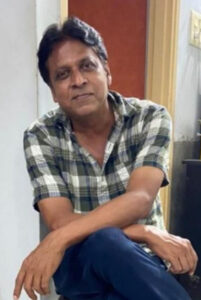
રાજ ગોસ્વામી
‘દીવાર’ ફિલ્મને 50 વર્ષ થયાં. 24 જાન્યુઆરી, 1975ના રોજ તે રિલીઝ થઇ હતી. 1.3 કરોડના ખર્ચ પર 4.75 કરોડની કમાણી સાથે ‘દીવાર’ તે વર્ષની સૌથી સફળ ફિલ્મ હતી એટલું જ નહીં, તે હિન્દી સિનેમાના ઇતિહાસની સૌથી મોટી સીમાચિહ્નરૂપ ફિલ્મ સાબિત થઇ હતી. આ ફિલ્મે અનેક કલાકાર-કસબીઓની તકદીર બદલી નાખી હતી, તેણે ફિલ્મ નિર્માણની શૈલી બદલી નાખી હતી અને હિન્દી સિનેમાના હીરોની વ્યાખ્યા નવેસરથી લખી હતી.
ફિલ્મમાં એક મશહૂર ડાયલોગ છે. ગોદી કામદાર તરીકે કામ કરતો વિજય તેના સિનિયર કામદાર રહીમ ચાચા(યુનૂસ પરવેઝ)ને કેન્ટીનમાં કહે છે; “રહીમ ચાચા, જો પચ્ચીસ બરસ મેં નહીં હુઆ, વો અબ હોગા.” એક રીતે, આ બયાન સલીલ-જાવેદનું હિન્દી ફિલ્મ ઇન્ડસ્ટ્રી માટે હતું. ‘દીવાર’માં જે થવાનું હતું તે પચીસ વર્ષમાં કોઈ ફિલ્મમાં થયું નહોતું.
એવી બહુ ઓછી ફિલ્મો છે જેની સમાજ પર ઘેરી અસર પડી હોય. એ દૃષ્ટિએ, ‘દીવાર’ (તે જ વર્ષે આવેલી) ‘શોલે’ કરતાં પણ વધુ અસરદાર ફિલ્મ છે. ‘શોલે’ શુદ્ધ રૂપે ફેન્ટસી છે અને તેનો ઉદેશ્ય દર્શકોનું મનોરંજન કરવાનો છે.
‘દીવાર’માં ય મનોરંજન તો છે, પણ તે તેનાં મૂળિયાં દેશની સામાજિક વાસ્તવિકતામાં ખૂંપેલાં છે અને એ રીતે તે એક બાયોપિક જેવી લાગે છે. તેનાં પાત્રો આપણી આસપાસના જ હતાં, એટલે તે ‘શોલે’ કરતાં પણ વધુ વિશ્વસનીય છે.
‘દીવાર’ની અભૂતપૂર્વ લોકપ્રિયતાનું કારણ તેની સુપર્બ ટેકનિકાલિટીમાં તો છે જે – જેમ કે સલીમ-જાવેદનો ચુસ્ત સ્ક્રીનપ્લે, તેમના સીટીમાર ડાયલોગ, યશ ચોપરાનું નિર્દેશન, કે.જી. કોરેગાંવકરની સિનેમેટોગ્રાફી, ટી.આર. મંગેશકર અને પ્રાણ મહેરાનું એડિટિંગ અને આર.ડી. બર્મનનું બેકગ્રાઉન્ડ મ્યુઝિક, પરંતુ તેનું મહત્ત્વનું કારણ ફિલ્મની વાર્તાનો ઈમોશનલ પ્રભાવ અને તેનાં પ્રમુખ પાત્રો(ખાસ કરીને અમિતાભ બચ્ચનના વિજય વર્મા)ની નૈતિક દુવિધામાં છે.
‘શોલે’થી વિપરીત, ‘દીવાર’નાં પાત્રો અને તેમના સંજોગો સાથે થિયેટરમાં બેઠેલા દર્શકો પર્સનલ કનેક્શન મહેસૂસ કરી શક્યા હતા તે તેની સ્થાયી લોકપ્રિયતા માટે મહત્ત્વનું કારણ છે. જેમ કે વિજય વર્મા મજબૂરીમાં અપરાધનો રસ્તો અપનાવે છે તેની સાથે દર્શકોને સહાનુભૂતિની હતી પરંતુ તેમનો ટેકો તો પ્રામાણિક પોલીસ ઓફિસર રવિ વર્મા (શશી કપૂર) સાથે હતો.

એ અર્થમાં, ‘દીવાર’ના દર્શકોની દુવિધા બંને ભાઈઓની માતા સુમિત્રા વર્મા (નિરુપા રોય) જેવી હતી; તેમનો પ્રેમ વિજય માટે હતો પણ ફરજ રવિ તરફે હતી. આપણે ત્યાં એક શબ્દ છે; ધર્મ સંકટ. ધર્મ સંકટનો મતલબ ધર્મ નહીં પણ નૈતિક દુવિધા. ધર્મ સંકટને ઇશ્વર-અલ્લાહ સાથે જોડીને સામાજિક અસમંજસને ફોકસમાં લાવવાનો પ્રયાસ હિન્દી સિનેમામાં ખૂબ થયો છે પરંતુ ‘દીવાર’ પહેલી ફિલ્મ છે જે એનાથી ય આગળ જઇને વ્યક્તિગત કશ્મકશની વાત કરે છે, જ્યાં વિકલ્પોની પસંદગી એટલી આસાન નથી હોતી જેટલી માનવામાં આવે છે.
દેખીતી રીતે જ, ‘દીવાર’ની પ્રેરણા 1957માં આવેલી મહેબૂબ ખાનની ‘મધર ઇન્ડિયા’ અને 1961માં આવેલી દિલીપ કુમારની ‘ગંગા જમુના’ છે. ‘મધર ઇન્ડિયા’માં રાધા (નરગિસ) તેના અપરાધી દીકરા બીરજુ(સુનીલ દત્ત)ને ખુદના હાથે સજા આપે છે.
દિલીપ કુમારે આ જ વિષયવસ્તુને ‘ગંગા જમુના’માં બે ભાઈઓ વચ્ચેના નૈતિક ટકરાવમાં ફેરવી નાખી હતી. તેમાં ગંગારામ (દિલીપ કુમાર) જમીનદારની ક્રુરતાથી પરેશાન થઈને બંધૂક હાથમાં ઉઠાવી લે છે અને તેના બદનસીબે તેનો ભાઈ જમનારામ (નસીર ખાન – દિલીપ કુમારનો અસલી ભાઈ) પોલીસ ઓફિસર બનીને તેની પાછળ લાગે છે.
સલીમ-જાવેદે ‘મધર ઇન્ડિયા’ની રાધા અને ‘ગંગા-જમના’ના ગંગારામ-જમનારામને ‘દીવાર’માં ભેગા કરીને શહેરમાં કેન્દ્રિત એક આધુનિક ક્રાઈમ થ્રિલરની રચના કરી હતી. ‘દીવાર’ કેમ લોકોના દિલને વધુ સ્પર્શી ગઈ તેનું કારણ એ હતું કે તે 70ના દાયકાના ભારતીય સમાજમાંથી આવી હતી. તે વખતે શહેરોમાં બેરોજગારીથી યુવાનો પરેશાન હતા, રાજકારણીઓ અને માફિયાઓની સાંઠગાંઠ હતી, ચારેતરફ ભ્રષ્ટાચાર હતો. સલીમ-જાવેદે તેમની વાર્તામાં શહેરોના યુવાનોની હતાશાને પ્રતિબિંબિત કરી હતી.
એક રીતે, સલીમ ખાન અને જાવેદ ખાન પણ એ જ હતાશામાં મોટા થયા હતા. તેમની પાસે પ્રતિભા હતી, નવી વાર્તાઓ હતી પરંતુ ઇન્ડસ્ટ્રીમાં તેમને કોઈ ગણતું નહોતું. તે વખતે સ્ક્રીનપ્લે લેખકને ન તો પૈસા મળતા હતા કે ન તો નામ મળતું હતું. સલીમ-જાવેદ આ પરંપરાને તોડવા માંગતા હતા. ‘દીવાર’નો હતાશ અને ક્રોધિત વિજય વાસ્તવમાં સલીમ-જાવેદ અને બીજા લાખો બેરોજગાર યુવાનોનો પ્રતિનિધિ હતો.
ફિલ્મમાં વિજય જ્યારે મરીન ડ્રાઈવ પર આવેલી ઓબેરોય હોટેલના સ્યુટમાં મુલ્ક રાજ દાવર(ઈફ્તેખાર)ને કહે છે કે, “મૈં આજ ભી ફેંકે હુએ પૈસે નહીં ઉઠાતા,” ત્યારે તેમાં જવાનીનો જોશ ઓછો અને એક ખુદ્દાર યુવાનની આત્મસન્માનની ભાવના વધુ હતી. એ સંવાદમાં દર્શકોને પોતાની ભાવનાનાં દર્શન થયાં હતાં.
આ ફિલ્મે બચ્ચનની છબીને એક પરેશાન અને સત્તા વિરોધી હીરો તરીકે મજબૂત કરી હતી. ‘દિવાર’માં આ હીરો જેવું વિસ્ફોટક પ્રદર્શન તે પહેલાં કે તે પછી ક્યારે ય આવ્યું નહોતું. બે વર્ષ પહેલાં, ‘ઝંજીર’માં તેની આછી ઝલક જોવા મળી હતી અને તેની સફળતાથી જ સલીમ-જાવેદને તેમના એન્ટી-હીરો અથવા એન્ગ્રી યંગ મેન પર ભરોસો બેસી ગયો હતો, જે ‘દીવાર’માં લાવા બનીએ વહ્યો હતો.
તેમને તેમની વાર્તા અને હીરો પર એટલો ભરોસો હતો કે વિજય વર્માની ભૂમિકા માટે તે વખતના ચક્રવર્તી સુપરસ્ટાર રાજેશ ખન્નાને અવગણીને અમિતાભનો આગ્રહ રાખ્યો હતો. ‘દીવાર’ના નિર્માતા ગુલશન રાયે ખન્નાને આ ભૂમિકા માટે સાઈન પણ કરી નાખ્યો હતો. એક ઇન્ટરવ્યુમાં ખન્ના કહે છે, “સલીમ-જાવેદ સાથે મારે મતભેદો હતા. તેમને અમિતાભને લઈને જ ફિલ્મ કરવી હતી, પણ ‘દીવાર’ની બે રીલ જોઇને જ મેં કહેલું – વાહ! ક્યા બાત હૈ!”
‘દીવાર’ની સ્ક્રીપ્ટ 18 દિવસમાં કરવામાં આવી હતી. તેના પરથી ખ્યાલ આવે છે કે સલીમ-જાવેદના દિમાગમાં કેટલી સ્પષ્ટતા હતી. તેમણે અમિતાભને ધ્યાનમાં રાખીને જ વાર્તા લખી હતી. જાવેદ અખ્તર જ્યારે અમિતાભને સ્ક્રીપ્ટ સંભળાવતા હતા, ત્યારે થોડા દૃશ્ય પછી તે વચ્ચે-વચ્ચે અમિતાભને કહેતા હતા, “એ આપ કે 15 હપ્તે હો ગયે … એ આપકે 25 હપ્તે હો ગયે.” અને સ્ક્રીપ્ટ પૂરી કરીને કહ્યું કે ‘એ આપકે 100 હપ્તે હો ગયે.”
હપ્તા યાની ફિલ્મ કેટલા સપ્તાહ ચાલશે તે. તેમને પૂરો વિશ્વાસ હતો કે ફિલ્મ લંબી રેસ કા ઘોડા હૈ. ‘દીવાર’ પૂરા ભારતનાં સિનેમા થિયેટરોમાં 100 હપ્તાથી વધુ સમય સુધી ‘હાઉસફૂલ’નાં પાટિયાં સાથે ચાલી. તે ફિલ્મે હિન્દી ફિલ્મોના હીરોની શકલ બદલી નાખી, અને અમિતાભના વ્યવસ્થા વિરોધી એન્ગ્રી યંગ મેન અને એન્ટિ-હીરોની ઈમેજને સખ્ત રીતે દર્શકોની ચેતનામાં જડી દીધી.
જાવેદ અખ્તર કહે છે, “અમિતજીએ ‘ઝંજીર’માં એન્ગ્રી યંગ મેનનો રોલ કર્યો હતો, પણ એમના પર સિક્કો વાગ્યો ‘દીવાર’થી. આપણે ‘મધર ઇન્ડિયા’ અને ‘ગંગા-જમુના’નમાં એન્ગ્રી યંગ મેન(સુનીલ દત્ત અને દિલીપકુમાર)ને જોયો હતો, પણ એ બહુ મોળો હતો, કારણ કે તે ફિલ્મોમાં રોમાંસ હતો, તમાશો હતો અને ગીતો હતાં. અમિતજીના આવવાથી એન્ગ્રી યંગ મેનને પાંખો આવી, કારણ કે એમાં મોળપણ ન હતું. એની અસર લોકો પર આજે ય છે.”
(પ્રગટ : ‘સુપરહિટ’ નામક લેખકની સાપ્તાહિક કોલમ, “સંદેશ”, 05 ફેબ્રુઆરી 2025)
સૌજન્ય : રાજભાઈ ગોસ્વામીની ફેઇસબૂક દીવાલેથી સાદર
![]()




